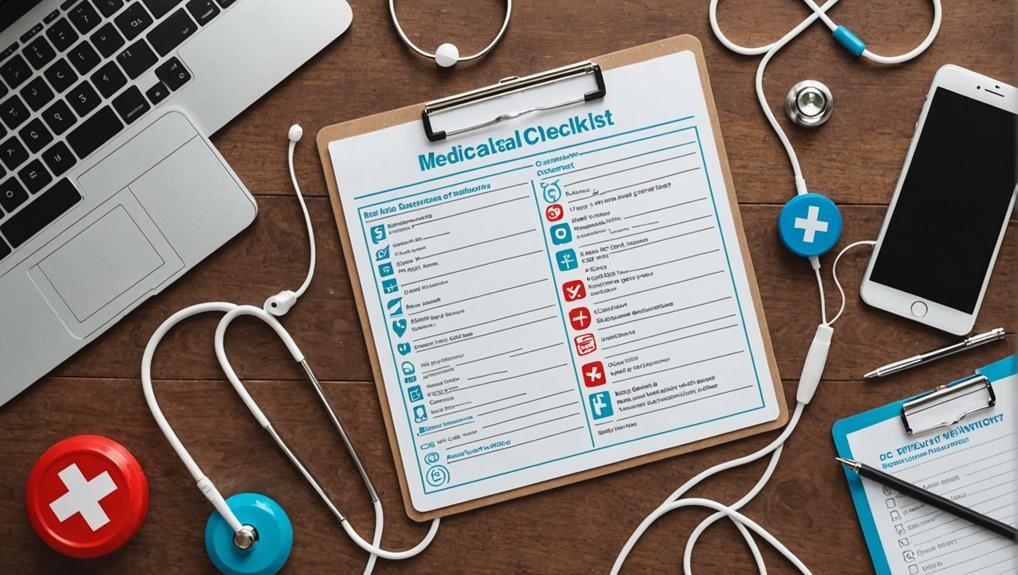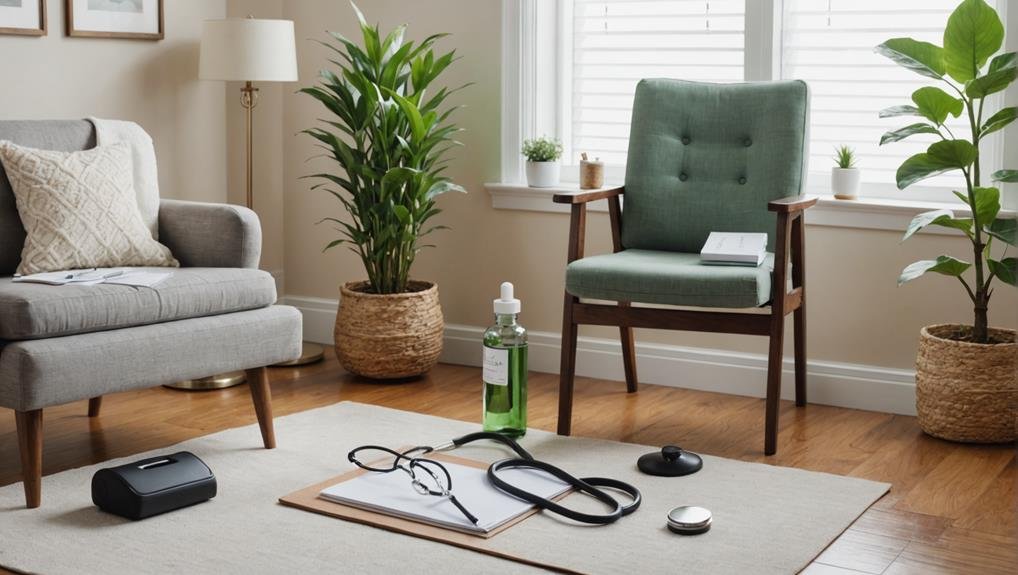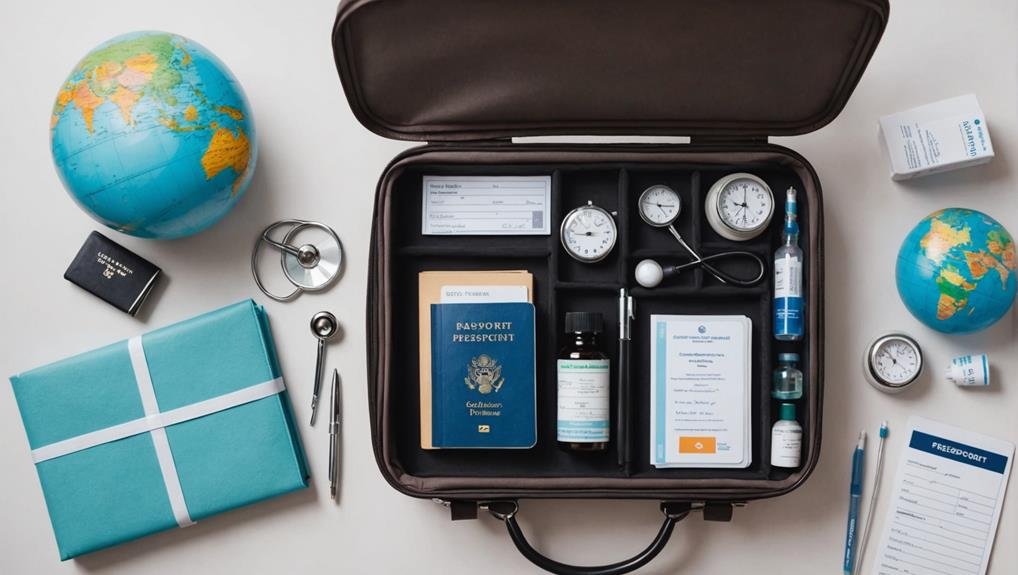When you’re getting ready to move overseas, having an extensive medical checklist is essential for your health and well-being. You need to gather a list of important contacts, including your family physician and local healthcare providers. Don’t overlook those pre-departure check-ups with your doctor and ob/gyn to address any specific health risks and ensure your immunizations are current. Packing necessary medical supplies, from prescription medications to first-aid kits, can make a significant difference. But there’s more to ponder—how do you manage stress and maintain your well-being in a new environment?
Key Takeaways
- Schedule pre-departure check-ups with your family doctor and ob/gyn to address health concerns and update immunizations.
- Keep a detailed medical sheet listing pre-existing conditions and necessary medications.
- Pack a well-stocked first-aid kit and carry prescription drugs in original packaging with a copy of the prescription.
- Practice proper hygiene, use mosquito repellent, and drink bottled water to prevent illnesses abroad.
- Incorporate regular exercise, adequate rest, and stress management practices into your routine for overall well-being.
Important Contact Lists

When settling into a new country, having a well-prepared list of vital contacts can make all the difference. First, make sure you have your family doctor’s contact details handy. They can provide valuable insights if you encounter health issues while abroad.
Also, note the national emergency numbers specific to your new country. These can be a lifesaver in urgent situations.
Nearby hospitals or physicians recommended by the embassy/consulate should also be on your list. These trusted sources can guide you to reliable medical care. Keep complete information about the nearest embassy/consulate, as they can offer essential emergency support.
A detailed medical sheet outlining any pre-existing conditions is necessary for managing your health effectively. This sheet will be invaluable when consulting new doctors.
Before leaving, schedule pre-departure check-ups with your family doctor and ob/gyn. They can advise you on immunizations, common diseases, and health risks you might face.
Pre-Departure Doctors Check-Up
Scheduling a pre-departure health check-up with your family doctor and ob/gyn at least two months before moving abroad is necessary. This appointment allows you to address potential health risks and get the required immunizations. Your family doctor can guide you through common diseases in your destination country and what vaccinations you’ll need to protect yourself.
During your visit, make sure to:
- Discuss health risks: Understand the specific health challenges in countries with harsh climates or lower medical standards.
- Get immunizations: Stay up-to-date on all required vaccinations, which can be vital in preventing common diseases abroad.
- Consult your ob/gyn: Talk about safe sex practices, especially if you’re moving with a partner, to take proper precautions.
- Review travelers’ health: Check the CDC website for detailed recommendations tailored to your destination.
Preparing for these aspects during your pre-departure check-up will help you feel confident and ready for your move.
Discuss personal health concerns with your family doctor and OB/GYN to ensure thorough care. This preemptive step will greatly contribute to your well-being as an expat woman.
Health Risks Abroad

Finding health risks abroad is vital for expatriate women to maintain their well-being. Living abroad exposes you to different health risks related to food, water, and animals. Proper hygiene practices, like frequent handwashing and avoiding raw or dirty foods, can help you prevent diseases.
To protect against mosquito-borne illnesses, mosquito repellents, nets, and long-sleeved garments are essential. Chlorinated swimming pools are generally safe, but you should be cautious with untreated water sources. Always drink bottled water and be careful about your food sources to avoid various health risks abroad.
Here’s a quick reference table on common health risks and preventive measures:
| Health Risk | Preventive Measure | Important Tip |
|---|---|---|
| Foodborne Illnesses | Proper hygiene practices | Avoid raw or dirty foods |
| Mosquito-Borne Illnesses | Use mosquito repellent and nets | Wear long-sleeved garments |
| Waterborne Illnesses | Drink bottled water | Be cautious with untreated water sources |
| Swimming Safety | Use chlorinated swimming pools | Avoid swimming in untreated water sources |
Medical Supplies
Having the right medical supplies can make a difference while living abroad. Start with a well-stocked first-aid kit with bandages, antiseptic wipes, and pain relievers. These items are essential for treating minor injuries and preventing infections.
Before you leave, consult your doctor or pharmacy assistant about specific medical supplies tailored to your health needs and destination. Always carry your prescription drugs in their original packaging along with a copy of the prescription to avoid any legal issues. Including a brief letter from your doctor explaining the necessity of your medication can also be helpful.
For added convenience and preparedness, pack the following items:
- Hand wipes – Useful for maintaining hygiene when soap and water aren’t available.
- Sanitary towels and tampons are essential for your monthly cycle, especially in places where they might be hard to find.
- Condoms – Important for sexual health and protection.
- Anti-yeast medications – Handy for treating infections that may arise in unfamiliar climates.
Remember to include any emergency medications you might need. Being well-prepared ensures you can address any health issues confidently and continue enjoying your time abroad.
Well-being and Stress Management

Amid the excitement of living overseas, it’s common for expat women to experience heightened stress levels. Prioritizing your health and well-being is vital, and effective stress management is key.
Incorporate self-care practices like regular exercise and taking downtime into your routine. These activities help manage stress and promote mental well-being.
Aim to balance your work and personal responsibilities; this equilibrium is essential for sustaining a healthy mind and body.
Don’t underestimate the power of sleep. Prioritizing adequate rest can greatly impact your overall well-being.
Create a calming bedtime routine and stick to a consistent sleep schedule.
If you are overwhelmed, seek professional help through an Expat Assistance Programme. These services support expat women facing unique challenges while living abroad.
Don’t hesitate to reach out if you need extra assistance.
Conclusion
In summary, staying proactive with your health is crucial while living abroad. Keep essential contacts handy, schedule pre-departure check-ups, and understand the health risks specific to your destination. Don’t forget to pack necessary medical supplies and prioritize your well-being. Managing stress and seeking professional help will guarantee you stay healthy and happy. Follow this checklist, and you’ll be well-prepared to enjoy your expat experience.
FAQs
1. What Is the Medical Checklist for a US Visa?
When applying for a US visa, you must undergo a physical examination, provide vaccination records, and complete a medical history questionnaire. An authorized physician will also conduct tests such as a TB test and blood tests for specific diseases.
2. What Is the Meaning of Expat Woman?
An expat woman is a woman who lives outside her native country for work, study, or personal reasons. Whether you’re an independent professional or accompanying a partner, you’ll face unique challenges related to health, safety, and cultural adaptation.

